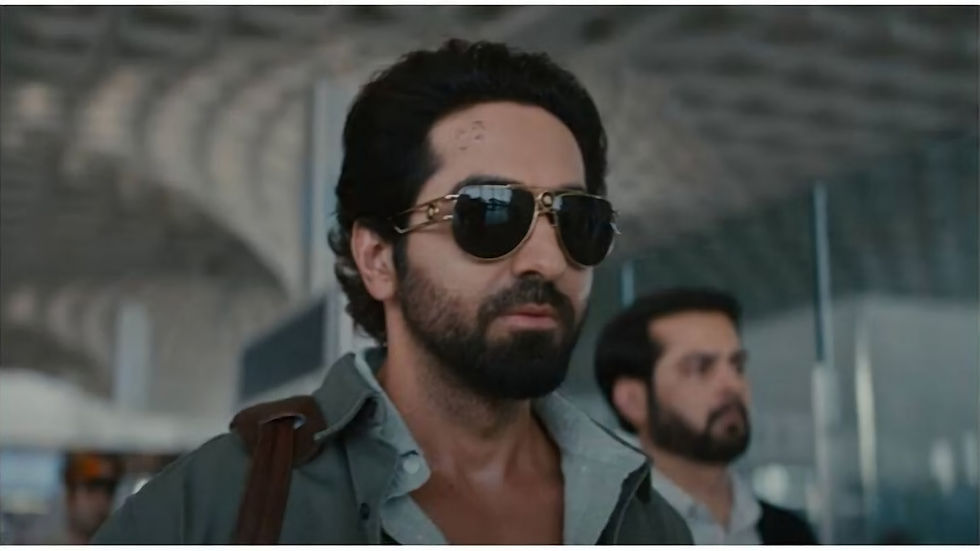AN ACTION HERO IS STYLISH, SMART AND SOME OF THE MOST FUN I'VE HAD AT THE THEATRE THIS YEAR.
- Humans of Cinema
- Feb 28, 2024
- 4 min read
By Harshit

In one of the earliest scenes in the film, Ayushmann's character Maanav says to the media that he has a certain social responsibility as an actor in India, and hence won't endorse certain films. The film's commentary on Indian celebrity culture and the underlying hypocrisy of it starts here itself, and becomes especially interesting as you think back on the preachy Akshay Kumar anti-smoking ad that you've just seen before the film. It becomes funnier when Akshay Kumar actually appears in the film in a cameo. In the same scene, Maanav proclaims, "Action hero hun, taakat ka istemaal last mein karta hun." It's a dialogue that's central to the film and reappears later in the story as well. It's reflective of the film's self- awareness as a satire on mainstream Indian films. He does indeed end up reserving his "strength" until the very end, following the very trope that the film tries to parody in the first place. Interestingly the film doesn't use harnesses to show the initial action sequence that Maanav is performing on his film set, and frames it exactly how action sequences are presented to the audiences in films. In a way, the film is giving in to the idea of "invincibility" of its hero. After all, we are only seeing those scenes in a flashback being narrated by Maanav to the RAW officials. This is how he wants to be perceived, both on and off the screen. Despite being a comedy, this film's portrayal of Haryana is much smarter and more well-researched compared to most films set in the state. As someone with roots in Haryana, the exaggerated stereotypes have always irked me. Granted, a lot of those stereotypes are also true, but their portrayal in cinema has rarely been as sincere as it is in this film. The best example is the local reporters, which reminded me of the countless social media journalists based in Haryana. Strongly recommend you to check them out on YouTube.The action scenes in this film, especially the ones in London, were especially fun to watch for the same reason that I stated earlier. As we're seeing them in Maanav's version of the events, we're seeing them in all their impossibility and absurdity, exactly how you'd see them in a Salman Khan or Tiger Shroff film. You'd notice the camera shifting to wide shots every time there is a really difficult somersault, but those have also been framed in a way that you can feel the "artificiality" of it. A lot of people will pass these scenes off as ridiculous, but the film's awareness of their absurdity, and the fact that they exist as a part of Maanav's imagination and what they say about him is what makes them so special.In another scene towards the end, Maanav says to the RAW officers, "Aapne maara.. maine maara.. humne maara.. kya fark padta hai? Kahaani hi to hai." It's a subtle reminder that this is a film about films, about stories, about everything that makes them so special and sinister at the same time. And about how stories change based on who's telling them, and how our perception of them shouldn't be devoid of a mindful understanding of the storytellers behind it. Maanav wants us to be convinced that stories are just stories, but it's important to remember that they're so much more. SPOILERS IN THE NEXT 3 SLIDES. I also find it interesting that in the 2 films about star culture made in the past couple of years: AK vs AK and An Action Hero, the "star" eventually comes out as the smarter one, or at least the "victorious" one by the end in the battle between the two protagonists, despite going through a series of challenges over the course of the film. We see them failing, being helpless, lonely, depressed, in a state of abject misfortune, and definitely not a state stars in India would have ever imagined to be represented in. But eventually, in both the films, they do win.

In both the films, you're compelled to buy into the idea that the stars are finally being vulnerable, empathetic, and are representative of this larger but strange era of evolution that we're experiencing in the country's cinema right now, which everyone wants to believe is marked by the fading of the star culture. But both the films do something very smart, where they make the stars win, making them walk out as the heroes that they've always been. It's almost like a joke on those who believe the stars are dying. The films want you to remember that even in the films that are parodying star culture, the star is the ever-powerful, he is still the hero and he is here to stay.An Action Hero is a film about many things, but one of the most striking aspect of the film is its attempt to understand what it truly means to be a hero in the country today. There is so much chatter right now about replacing "film heroes" with "real heroes", it's brave for the film industry to acknowledge the difficult conversation and make such a self-reflective but yet entertaining film about it that takes neither itself nor the film business too seriously. In a year of great films filled with anti-heroes, this film presents one of the most distinct studies of the anti-hero. The fall of an anti-hero who's a hero for the people, and then his journey to really try to be a hero, to his eventual embrace of villain hood, which is instead celebrated as heroism. It's truly mind-boggling, but SO is our understanding of heroes.



Comments